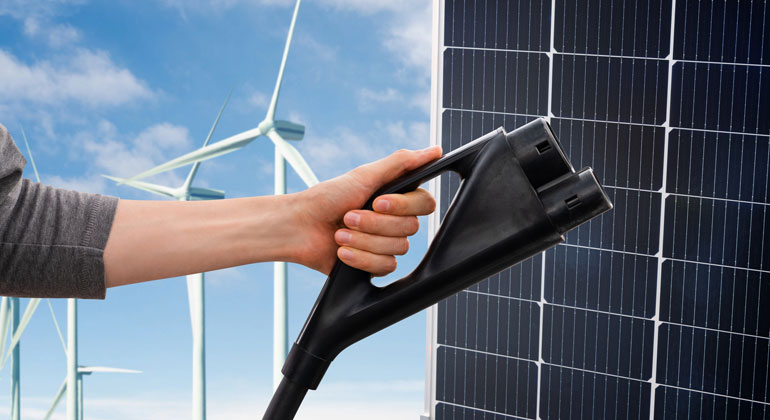Electric cars and photovoltaics: environmental impact of important raw materials
Study highlights health risks of technologically critical elements for the energy transition.
The transition to low-emission technologies such as electric vehicles and photovoltaic systems is central to climate protection and also brings major benefits for public health, e.g. through less air pollution. However, these technological solutions use materials such as so-called technologically critical elements (TCEs), some of which are potentially harmful to the environment and human health. An interdisciplinary research team involving environmental medicine specialist Daniela Haluza from MedUni Vienna’s Center for Public Health, in collaboration with the University of Natural Resources and Life Sciences, Vienna (BOKU) and the Montanuniversität Leoben, is the first to reveal the potential health risks that can arise from the use of TCEs. The study, published in the renowned Journal of Industrial Ecology, provides important insights into the effects of the energy transition on people and the environment.
Low-emission technologies such as electric vehicles and photovoltaic systems are key to tackling the climate crisis and will also contribute to improving air quality. However, these technological innovations require the use of TCEs such as neodymium, dysprosium and lanthanum – chemical elements that are classified as rare earth elements. “Their extraction and consumption are increasing rapidly worldwide. At the same time, they are not only difficult to recycle, but also pose risks to the environment and human health,” explains Daniela Haluza from MedUni Vienna. While the effects of mining these substances are well documented, how they are released during use in urban areas has so far remained largely unexplored. The current study analyzed the release of TCEs through abrasion and corrosion of vehicle parts as well as weathering on thin-film photovoltaic modules in Vienna. Using a model, 21 technologies from the vehicle and renewable energy sectors were examined and future scenarios simulated.
The results show that the electrification of vehicle fleets without accompanying measures to reduce transport demand would double the consumption of technologically critical elements (TCEs) by 2060. As a result, up to 3,073 tons of TCEs would have to be disposed of at the end of their service life and up to 15.7 tons would be released into the environment during use. The results also underline that measures such as promoting local public transport or avoiding unnecessary journeys in private vehicles could make a significant contribution to noticeably reducing these emissions. “This could also significantly reduce potential health risks associated with the accumulation of TCEs in urban environments,” Haluza interprets the results of the study.
Major significance for public health
The study emphasizes that the transition to low-emission technologies requires not only decarbonization, but also a reduction in the overall demand for raw materials. Without additional measures, significant amounts of TCEs could be released into the environment, which could pose long-term health risks.” Our results provide an important basis to assess the potential impact of the accumulation of TCEs in urban environments. At the same time, they show that we need to combine the energy transition with a strategic reduction in resource consumption,” explains environmental health expert Haluza. The study authors recommend increased interdisciplinary research to better understand the release of TCEs and their uptake into the human body. This is crucial in order to minimize health risks in the short term and for future generations.
The TeCEUS project, from which the study emerged, is funded by the Austrian Science Fund (FWF) and investigates the urban stocks and fluxes of TCEs. Further information can be found at www.teceus.at.
- Journal of Industrial Ecology „In-use dissipation of technology-critical elements from vehicles and renewable energy technologies in Vienna, Austria: A public health matter?“ | https://doi.org/10.1111/jiec.13571








